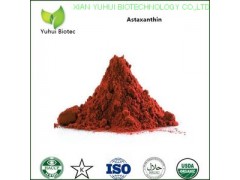Astaxanthin, a member of the carotenoid family, is an oxygenated red-orange pigment. Professor Basil Weedon was the first to map the structure of astaxanthin. Astaxanthin is found in microalgae, yeast, salmon, trout, shrimp, crustaceans, and other sources. However, Haematococcus pluvialis appears to be the best source of astaxanthin. Astaxanthin cannot be synthesized by human and it must be provided in the diet. Astaxanthin has been proven to be one of the most powerful anti-oxidants yet discovered. University study shows Astaxanthin to be up to 550 effective than Vitamin E and 4 times than lutein in various antioxidant capacities.It freely crosses the blood-brain and blood-retina barriers to provide powerful support for eye and nervous system health. Moreover, increasing evidence suggests that Astaxanthin has extremely useful characteristics in scavenging of active oxygen, immune stimulation, cancer prevention and so on. Preclinical studies demonstrate that astaxanthin is safe and no known side effects.
Product De
Product Name: Astaxanthin
Latin Name: Haematococcus pluvialis
Synonyms: Haematococcus pluvialis Extract
Specification: Astaxanthin 1.5% 10%
Appearance: Purple to violet-powder
CAS No.: 472-61-7
Main Function:
1.With the function of good antioxidant, increasing the flexibility of capillaries and reducing injury;
2.With the function of anti-radicalization and anti-aging;
3.With the function of eliminating the harmful free radicals in vivo;
4. With the function of prevention of treating of cardiovascular diseases;
5. With the function of enhancing immunity.
Application
1. Applied in food field, it is mainly used as food additives for pigment and health care.
2. Applied in animal feeds field, it is used as an new animal feed additive to impart coloration, including farm-raised salmon and egg yolks.
3. Applied in pharmaceutical field, it is mainly used to prevent cancer and anti-oxidant.
4. Applied in cosmetic field, it is mainly used to Antioxidant and UV protection.





